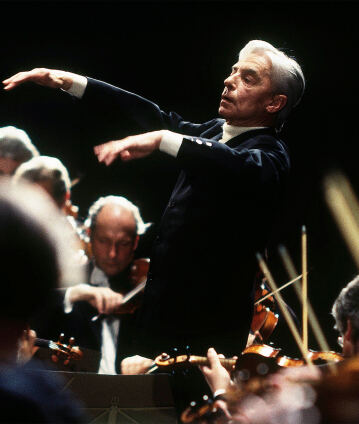Karajan conducts Beethoven’s “Missa solemnis” in Salzburg

Beethoven’s Missa solemnis is one of the most impressive sacred compositions there is, in which religious affirmation, virtuosic vocal music and a large-scale symphonic framework combine to create a powerful whole. Herbert von Karajan, who was a deeply committed Christian, realised an equally devout and powerful rendition in this performance at the Salzburg Easter Festival.
Herbert von Karajan learned his trade conducting opera as an assistant Kapellmeister in Ulm in the early 1930s. However, it was in Aachen, where he became Germany’s youngest Generalmusikdirektor at the age of 27 in 1935, that his horizons began to expand. During his Aachen years, Karajan developed the “core” choral repertory to which he returned time and again until his death. Six works stood at the heart of this repertory: Bach’s B minor Mass and St Matthew Passion, Haydn’s The Creation, Beethoven’s Missa solemnis, Brahms German Requiem and Verdi’s Messa da Requiem.
Karajan first conducted the Missa solemnis in Aachen in November 1937, three days before the start of his first complete cycle of Wagner’s Ring. The performance created a sensation and would later be heard in Brussels and Berlin. His first post-war performance of the work took place in Vienna in January 1949 with the Wiener Singverein. Appointed as the Singverein’s director for life in 1950, Karajan worked with the choir more or less exclusively for the next four decades. In 1950–51, Karajan and the choir performed the Missa solemnis in churches and concert halls throughout Italy. In 1967, he chose the Missa solemnis as the choral work at his inaugural Salzburg Easter Festival. The present recording is a television transmission from the 1979 Festival.
In both Bach’s B minor Mass and Beethoven’s Missa solemnis, Karajan brought a particular intensity to his realisation of the Credo with its central movements of Incarnation, Crucifixion and Resurrection. Whatever his public image might have suggested to the contrary, Karajan’s private beliefs ran deep.
© 1979 Unitel
Category
Artists
Our recommendations
- Karajan conducts Bach
- Karajan conducts Brahms’s “German Requiem” in Salzburg
- Claudio Abbado conducts works with a maritime theme at the 1998 Europakonzert from Stockholm
- Simon Rattle conducts Bruckner, Ravel and Hosokawa in Taiwan
- Claudio Abbado conducts Russian works at Suntory Hall in Tokyo
- Simon Rattle conducts Beethoven’s Ninth Symphony in Madrid